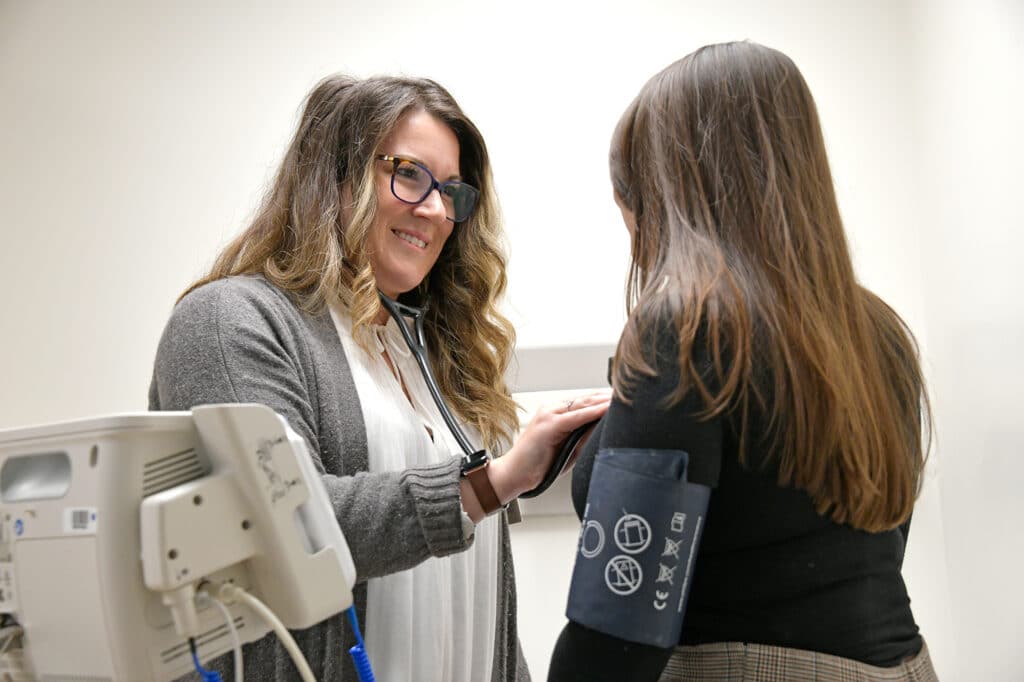

The Simcoe Muskoka Regional Eating Disorder Program (SMREDP) is a regional program offered in partnership with Royal Victoria Regional Health Centre and Orillia Soldiers’ Memorial Hospital. The SMREDP provides evidence-based outpatient eating disorder treatment to children, adolescents and young adults under the age of 25 within Barrie, Orillia and surrounding areas of Simcoe County.
Commitment to diversity, equity, and accessibility
As a team, we are actively committed to acknowledging and eliminating the ways in which treatments have been/are invalidating, marginalizing, discriminatory, and/or inaccessible to people of diverse backgrounds. We engage in regular training and consultation with experts in the B/I/POC and 2SLGBTQ+ communities. We encourage feedback from our clients, families, and community partners about our services. We actively work on ways to create safe and respectful environments for all clients and staff from diverse backgrounds. We also expect our clients to respect the diverse experiences of those we treat and those who provide service. For those in our programs, we expect our patients to commit to our zero-tolerance policy on discriminatory or derogatory statements or behaviours to ensure safety for everyone.
The Interdisciplinary Team

Medical Monitoring
Eating disorders are serious mental health illnesses with the potential for life-threatening complications. The Paediatrician and Nurse Practitioner are the team members that will be monitoring the patient’s physical health, and provide assessment, treatment, guidance, and feedback to the patient, the patient’s family and to the Eating Disorder Clinician that supports the patient’s evidence-based treatment plan. As part of our commitment to trauma-informed care, we understand that having a physical assessment completed can be difficult for our patients. The NP/Paediatrician will work with the patient to ensure they feel safe and are well-informed about each step of the assessment before proceeding.
A Paediatrician is a doctor who specializes in the care of infants, children, and adolescents up until the age of 18. The Paediatrician functions as a consultant to the parents and primary clinician and will not generally direct care unless there are immediate safety concerns. The Paediatrician’s role (particularly in FBT) is to provide information that builds parents’ confidence and helps them to make informed treatment decisions in the best interest of their child/adolescent.
A Nurse Practitioner (NP) is a Registered Nurse in the Extended Class. NPs are graduate-prepared and regulated by the College of Nurses. NPs independently, and in collaboration with health care professionals, provide health care services for all ages and across the health spectrum. Like the Paediatrician, the NP functions as a consultant to the parents and the primary Eating Disorder Clinician and will generally not direct care unless there are immediate safety concerns.
In the eating disorder program, the patient can expect the NP or Paediatrician involved in their care to:
- Complete a comprehensive health history and assessment;
- Formulate and communicate a diagnosis, taking a differential diagnoses into consideration;
- Provide education regarding the findings of the assessment, and how this might relate to the eating disorder and the treatment plan
- Prescribe medications if needed
- Order and interpret laboratory tests and other diagnostic investigations such as ECG, Holter monitors and bone scans/BMD;
- Determine whether the patient is physically and emotionally safe to undertake outpatient treatment, or whether admission is indicated. Should the Paediatrician or NP identify a medical issue that requires intervention or hospitalization, they are obliged to provide relevant information and recommendations to the patient, their parent(s) or guardian, and the clinician
- Refer the patient to other specialists if needed, or other eating disorder programs that offer higher levels of care (i.e. day treatment)
- Advocate for the patient and their family by communicating the impacts of the eating disorder on their education, and providing letters of support for parents to take time away from work, and for the patient if they need to miss school
A Registered Nurse (RN) has completed a 4-year bachelor degree in nursing, and is regulated by the College of Nurses in Ontario. The patient can expect the RN involved in their care to:
- Complete a focused physical assessment that will include vital signs
- Work collaboratively with the Paediatrician or NP, and the Eating Disorder Clinician and Dietitian to deliver quality care.
- Provide education
The team’s Registered Dietitian (RD) is a regulated health professional who has extensive training and expertise working with patients with eating disorders. The RD is a specialist in supporting the delivery of nutrition therapy and education to clients to assist them in meeting their nutritional needs and understanding the connection between food and their physical/mental health.
In partnership with the patient, their family and the Eating Disorder Clinician, the patient can expect the dietitian to:
- Collaborate with the Paediatrician or NP on calculating a progress weight
- Provide education regarding weight and nutritional science as indicated
- Complete comprehensive nutritional assessments
- Prioritize strategies and nutrition interventions to assist the patient to achieve optimal health outcomes
- Provide education on recovery-focused meal plans as indicated
- Inform meal planning and nutritional advancements should the patient require hospitalization for medical stabilization
- Provide education regarding any nutritional deficiencies and how this may relate to the eating disorder
Therapeutic Support
Master of Social Workers and Clinical Counselling are regulated health professionals who are registered with the Ontario College of Social Workers and Social Service Workers or the Ontario College of Psychotherapy. They are responsible to provide in-depth psychosocial assessments, assess and identify a child, adolescent, and family strengths, and assess and incorporate problem-solving abilities, dynamics, interactions, attitudes, feelings, and cultural issues in relation to the child and adolescent, and young adult (under the age of 25) with an eating disorder.
The Eating Disorder Clinician will work collaboratively with the team in the initial multidisciplinary assessment to develop and implement a plan of intervention, which incorporates a range of facets including education, coping and compliance. This will be achieved through a variety of modalities including individual therapy, family therapy, group work, consultation, case management, community outreach and advocacy. The Eating Disorder Clinician delivers care utilizing Family Based Therapy and Cognitive Behaviour Therapy.
Child and Youth Counsellors (CYCs) have a three-year college diploma in Child and Youth Work, graduating with 1500 hours of field work.
CYCs are a unique group of professionals that have a long history of supporting young people and their families in managing complex needs. We develop and implement a wide range of prevention, intervention and treatment strategies to foster positive change and healthy development.
We run groups, provide assessments and crisis prevention or intervention strategies. We foster and utilize therapeutic environments to maximize learning and growth for young people. We focus on social skills, strengths-building, emotional growth and development, and overall functioning in the context of the family and social environment.
Is a Masters of Social Work, and has the following roles and responsibilities:
- Program planning and development with management and regional partners
- Responsible for creating and providing clinical supervision to inter-disciplinary team
- Responsible for the triaging of Eating Disorder Program patient referrals in consultation with the program Physician(s) and/or Nurse Practitioner(s) for outpatient activity, including referring regional partner hospitals
- Oversee implementation of new clinical models of service and integration with medical management models
- Education of patients, physicians and other health care professionals regarding eating disorder best practice and services navigation and to build community capacity.
- Provide oversight to demands of program such as patient flow, gaps in service, service efficacy and triage
- Responsible for maintaining an up to date wait list and compiling waitlist information when requested.
Psychologists study cognitive, emotional, and social processes and behaviour by observing, interpreting, and recording how people relate to one another and to their environments. They use their findings to help improve processes and behaviours. The psychologist provides case consultation and supervision to support the team with complex patients and will also provide program fidelity support.
A psychiatrist is a physician that specializes in the diagnosis and treatment of mental illness. The Consultant Psychiatrist with their comprehensive Psychiatric, Medical and Psychological training offer clinical leadership to Eating Disorder Services teams to deliver high quality care to patients who suffer from Eating Disorders and have very complex needs. Consultant Psychiatrists are also able to use their expertise in Mental Health Act, Mental Capacity Act and other forms of legislations (e.g. Children’s Act) to offer best possible care to the patients and safeguard their interests.
What is an eating disorder?
Eating disorders are complex mental health illnesses that are biologically-influenced and have physical manifestations that can lead to significant and life-threatening complications. Eating disorders are not a personal choice. Eating disorders are treatable, and recovery is possible.
How does someone develop an eating disorder?
A number of factors can contribute to the development of an eating disorder, which can include biological (such as genetics), psychological (such as certain personality traits and temperaments), and social (including cultural norms about food and appearance). Individuals who are struggling with their identity and self-image can be at risk, as can those who have experienced trauma. Because stigma continues to exist about eating disorders and mental health illness, some people may be secretive or ashamed and go to great lengths to hide their disorder.
How can you tell if someone might have an eating disorder?
Eating disorders affect people of all ages, gender, classes, abilities, races and ethnic backgrounds, and you cannot tell that someone has an eating disorder from their physical appearance. It may be difficult to spot an eating disorder as signs may be mistaken as dieting, or a person struggling with an eating disorder may be reluctant to share their concerns. If you or a loved one has an eating disorder, you may notice these changes:
- Mood swings
- Increased fatigue, fainting or lightheadedness
- Thinning hair or hair loss
- Frequent bathroom breaks after eating
- Unexplained weight changes or drastic weight loss, or a child that has not gained weight appropriately for their age (i.e. weight has remained the same over a prolonged period of time)
- Not wanting to eat with other people at home or in social situations
- Increased rigidity or inflexibility around food choices
- Fixation on food, calories, exercise or weight loss
- Withdrawing from friends or social situations
- Food rituals
What should you do if you or a loved one suspect you might have an eating disorder?
Take concerns seriously and talk to someone that can help. Make an appointment to your family provider (physician or nurse practitioner) who will complete a physical assessment and can complete a referral to the Simcoe Muskoka Regional Eating Disorder Program. Please visit the National Eating Disorder Information Centre (NEDIC) website for more information about eating disorders. NEDIC | general information
Additionally, NEDIC operates a toll-free helpline and live chat that provides resources, referrals and support to people across Canada either directly or indirectly affected by disordered eating and related concerns:
1-866-633-4220
nedic@uhn.ca
Live chat: NEDIC | home
Monday to Thursday: 9 a.m. – 9 p.m.
Friday: 9 a.m. – 5 p.m.
Saturday and Sunday: 12 p.m. – 5 p.m.
If there is concern about yourself or a loved one’s immediate physical or emotional health/safety, consider consulting the attached algorithm from NEID, and please visit your closest emergency department for urgent assessment. NIED-Safety-Crisis-Readiness-Caregivers-Tool_FINAL.pdf

What we offer
Pre-treatment Assessment and Intervention
If you or a family member has difficulty with eating and you think you or a loved one might have an eating disorder, it is recommended that you be assessed by a medical professional (physician or NP) who can complete a referral to our program. All referrals will be reviewed by an intake team member for medical stability. The team will provide your doctor or NP with estimated wait times, and recommendations for how frequently you should be monitored medically. The team will also provide resources for you or for parents to review while awaiting assessment.
Should there be information on the referral that fulfills criteria for hospitalization, your doctor or NP will be notified of concerns and will be advised to send you to the emergency department for consideration of hospitalization. It is important to note that even if you happen to not be hospitalized, this is still very serious and you are at risk for medical decline. This is why you will need to continue to be closely monitored by your family provider while you or your family member awaits specialized eating disorder services.
All referred patients will be offered a pre-treatment assessment. It is important to note that the pre-treatment assessment is not active eating disorder treatment. During the first pre-treatment session, the team will complete a comprehensive interdisciplinary assessment, which will help to clarify a possible eating disorder diagnosis, and whether it is in your best interest to proceed with Family Based Therapy or Enhanced Cognitive Behavioural Therapy. If this is determined during the initial assessment, you will be offered treatment that day, and proceed with treatment as soon as it is available. If more time is needed to help us understand how you are struggling, you will have up to 3 additional sessions (4 in total, once per week) for added team support and system navigation to community resources that may more appropriately meet your needs. The initial pre-treatment assessment is completed by the NP, CYC and RD, and subsequent sessions may be with any or all team members (including the MSW) depending on the situation. There is no capacity to see a patient beyond 4 pre-treatment sessions, and all 4 sessions (if needed) should be completed within a 4-week period.
Evidence-Based Eating Disorder Treatment
Our program currently offers manualized outpatient Family-Based Therapy and Enhanced Cognitive Based Therapy to patients under the age of 25 for the treatment of Anorexia Nervosa, Bulimia Nervosa, and Other Specified Feeding or Eating Disorder (OSFED). This treatment is most effective when it is offered in its manualized form, and clinical supervision is one way our team ensures we stay adherent to the treatment model (also known as fidelity to the model).
Our program is not currently providing treatment for Avoidant-Restrictive Food Intake Disorder (ARFID) or Binge Eating Disorder (BED) at this time. Our program can diagnose ARFID and BED during pre-treatment assessment, and will provide psychoeducation, system navigation, appropriate resources and referral recommendations as indicated during the pre-treatment intervention.
What is Family-Based Therapy?
Family-based treatment (FBT) is one way to treat an eating disorder, and is considered to be a first-line treatment. It is the most commonly recommended treatment in our program. FBT is most effective with children and teens with Anorexia Nervosa and Bulimia Nervosa, and it can also be used for youth (under the age of 25) that are living at home. FBT is a parent-empowerment model that supports parents in disrupting the harmful behaviours that maintain an eating disorder. FBT is an outpatient treatment, and for most families, FBT involves 20 therapy sessions delivered in three phases over one year. All types of families can use FBT to restore their child’s health. Success is greater with their active involvement and support.
What is Enhanced Cognitive Behavioural Therapy?
Enhanced Cognitive Behavioural Therapy, or CBT-E, is another effective treatment for eating disorders. Where FBT is more effective for Anorexia and Bulimia, CBT-E is a transdiagnostic treatment. This means it can be effective for AN, BN, and other types of eating disorders. It is an outpatient treatment that may be offered if FBT isn’t right for you, or if you are an adult living outside the home. It is a highly individualized treatment, and for patients who aren’t significantly underweight, CBT-E generally involves 20 treatment sessions delivered in four stages over 20 weeks. With people who are underweight, treatment needs to be longer and often involves around 40 sessions over 40 weeks.
If the team recommends FBT or CBT-E for yourself or your family, your therapist will discuss the recommended treatment modality in greater detail and help you decide if it is right for you/your family.
The following resources are recommended for you and your parents to explore while awaiting initial assessment:
Websites:
Body Brave (14+): Our Services | Body Brave
Families Empowered and Supporting Treatment for Eating Disorders (F.E.A.S.T) Info for Parents – FEAST (feast-ed.org)
Books:
Help Your Teenager Beat an Eating Disorder, 2nd Edition (2015) by James Lock and Daniel Le Grange. Available on Amazon: Help Your Teenager Beat an Eating Disorder, Second Edition: Lock, James, Le Grange, Daniel: 9781462517480: Books – Amazon.ca
A Parent’s Guide to Defeating Eating Disorders: Spotting the Stealth Bomber and Other Symbolic Approaches (2011), by Ahmed Boachie and Karin Jasper. Available on Amazon: Amazon.ca : ahmed boachie spotting the stealth bomber eating disorders
Contact
For general inquiries, please contact:
(705) 728-9090 EXT. 43504
The partnership between Royal Victoria Regional Health Centre and Orillia Soldiers’ Memorial Hospital was made possible through a generous grant from TD Bank Group through the TD Ready Commitment in support of the Advanced Community Eating Disorders (ACED) Care initiative.


